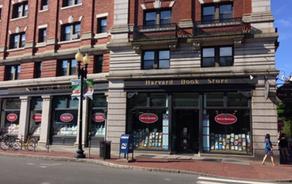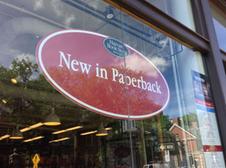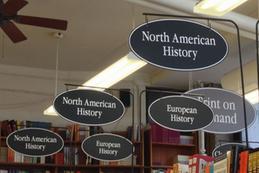Last month, Shelf Awareness editor-in-chief John Mutter went on a whirlwind bookstore tour in Massachusetts with New England Independent Booksellers Association executive director Steve Fischer. (See part one and part two.)
 At dinner on our first night in Cambridge, some of the Harvard Book Store staff was on hand--and basking in the satisfying if exhausting afterglow of the sold-out signing they had held the night before for Hillary Clinton and her new book, Hard Choices. More than 900 copies were sold, one of the larger in an impressive series of events the store puts on. (June author events at the store featured, among others, David Sedaris, John Waters, Laurence Tribe, Evan Osnos, Howard Norman and Emma Straub.) Luckily for the store, the weather held up and long, well-marked lines snaked through streets near Harvard Square after marketing manager Alex Meriwether worked miracles with logistics.)
At dinner on our first night in Cambridge, some of the Harvard Book Store staff was on hand--and basking in the satisfying if exhausting afterglow of the sold-out signing they had held the night before for Hillary Clinton and her new book, Hard Choices. More than 900 copies were sold, one of the larger in an impressive series of events the store puts on. (June author events at the store featured, among others, David Sedaris, John Waters, Laurence Tribe, Evan Osnos, Howard Norman and Emma Straub.) Luckily for the store, the weather held up and long, well-marked lines snaked through streets near Harvard Square after marketing manager Alex Meriwether worked miracles with logistics.)
Harvard is another long-established New England bookstore that in recent years has changed owners: in 2008, Jeff Mayersohn and his wife, Linda Seamonson, bought the store from Frank Kramer, whose father founded Harvard Book Store in 1932. (As with other bookstore sales, the Harvard transaction was brokered by Ridge Hill Partners, Needham, Mass., which has also handled the sales of Wellesley Booksmith, Porter Square Books and New England Mobile Book Fair. Paul Siegenthaler, president of Ridge Hill Partners, has created an unusual niche in the bookselling business in Massachusetts.)
As at the other stores, the transition has gone smoothly. Most of the staff has remained in place, including store manager Mark Lamphier, Rachel Cass, who is now head buyer, and longtime general manager Carole Horne, who was instrumental in making sure the changeover went smoothly. If anything, the store, which is independent of Harvard University, is an even greater example of a bookseller that does several things very well: it serves both Harvard customers and general readers, which means having a strong academic inventory as well as a striking selection of new and general titles. (It has a strong selection of used and remainder titles, too.) After a leisurely breakfast in a diner in Harvard Square, Carole, who's a wonderful combination of smart, soft-spoken and dryly witty, took Steve and me to the store to point out some of the changes the store has made recently. Under its new owners, Harvard Book Store has continued to be innovate in both high-tech and low-tech ways: it was one of the first stores to install an Espresso Book Machine, dubbed Paige M. Gutenborg (the winner of a contest that drew more than 500 suggestions), and it started a delivery service via bike. Recently the store launched an iPhone app with Aisle Connect that links users with the store's computer and offers maps of the store, reviews and recommendations and indications of where books can be found on the store shelves.
After a leisurely breakfast in a diner in Harvard Square, Carole, who's a wonderful combination of smart, soft-spoken and dryly witty, took Steve and me to the store to point out some of the changes the store has made recently. Under its new owners, Harvard Book Store has continued to be innovate in both high-tech and low-tech ways: it was one of the first stores to install an Espresso Book Machine, dubbed Paige M. Gutenborg (the winner of a contest that drew more than 500 suggestions), and it started a delivery service via bike. Recently the store launched an iPhone app with Aisle Connect that links users with the store's computer and offers maps of the store, reviews and recommendations and indications of where books can be found on the store shelves.

The store has also improved its signage both inside and out. Signs in the windows with short messages in large type (including "Publisher Focus," "New in Hardcover," "New in Paperback" and "Used Books") make it "easy for people to see us as they drive by," Horne said. Inside, Harvard Book Store has done something we've never seen in a bookstore: it has section signage that hangs out perpendicular to the shelving. Horne said that they worried that the signs might look cluttered and "like a pharmacy" but noted that the signs make it much easier for customers to find sections and for staff to point customers in the right direction. The signs are also done in Harvard Book Store's elegant style--no worries about their looks.

